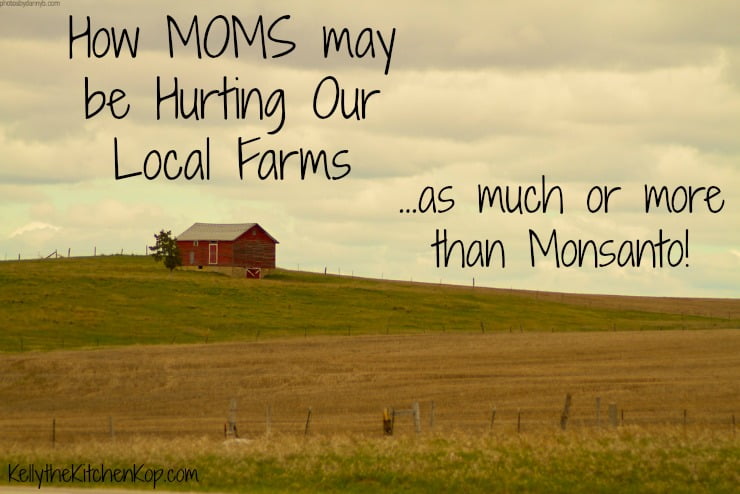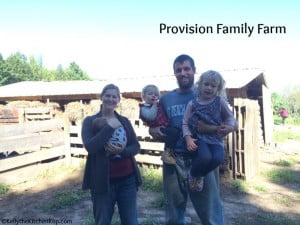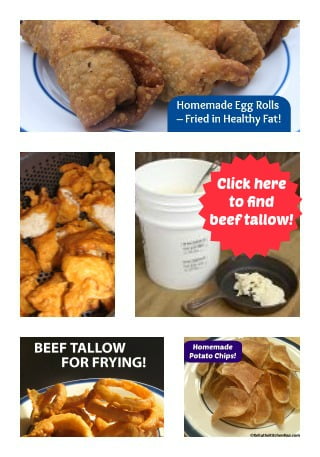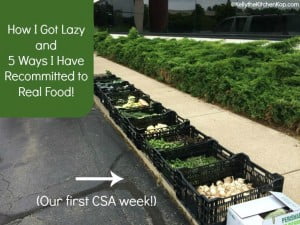
What is hurting local farms more than Monsanto?
First of all, let me be clear. I'm not pointing a finger at you, but instead it's pointing right back at myself. We are all so busy and do too much! Us Moms run around all day every day, trying to do the best we can for our kids. To feed them well, to help them have all they need socially and academically. Especially lately when we add in Christmas shopping, cooking, baking, and wrapping… Wow, we spread ourselves thin!
But our need for convenience is hurting our local farmers. (Don't worry, though, I have a solution.)
By the way, it wasn't me who said it first. Yesterday when one of my favorite farmers was dropping off my local pastured meat order to our house (pretty awesome, right?!), I asked if the $5 delivery charge was enough to make it worth it for him? He said so far it's working out. (Although he may require a minimum order amount moving forward.) He considers it as a way to meet the needs of his customers who want convenience, since the farmers market he normally sells at is seeing less people come through all the time, and it's a trend he says is happening everywhere.
WHAT?! But the real food movement is growing, why would farmers markets be shrinking?!
He told me about something he read in his Acres USA magazine the other day (December 2016 issue, pp. 22-27), where Joel Salatin said this,
Anyone who thinks industrial organics want to co-exist with local integrity food is living in la-la land. We're not the same.”
and this:
“In a recent farm tour, I surprised myself by saying to the assembled group: ‘Industrial organics is now just as big a liability in our food system as Monsanto.'“
It's us Moms buying convenient “industrial organics” at places like Walmart, Meijer, and Costco that is as big of a liability to farmers as Monsanto!

Yes, I've been just as excited as any other real foodie Mom to see our organic choices growing at the local grocery store…
Because it means food companies are finally starting to GET IT, that we don't want to put crap into our kids' bodies! I'll happily buy things like organic whole milk grass-fed yogurt from the store, organic grass-fed cream cheese, or pastured-butter, among many other things that I can't get from my farmer or don't want to make myself, but there are some foods I've gotten completely out of the habit of buying at the grocery store:
- I very very rarely buy organic meat at the grocery store, or even local “farm stores”, I flat-out don't trust it. Industrial organic meats are likely just factory farmed animals fed organic grains, and the meat labels at the store may boast “no antibiotics”, and to that I say, BIG DEAL, that's the very minimum we should expect. I get most of our meat from my local pasture-based farmer because I have visited his farm, he is okay with me asking him questions, and we have become friends. (I started out setting up a local drop for this farmer, which helped my friends out too, but as mentioned above, he is now coming to our homes to drop off!) I also have a favorite butcher who I use for last-minute meats, because he sources from mainly pasture-based sustainable farms.
- I also never buy organic milk at the store for the same reason, I don't trust it — and most of it is ULTRA-pasteurized! Read more about why that's so bad here. Instead 5 families nearby are in a cowpool and we get our fresh real milk from the farm — I only have to do the driving every five weeks.
- I only buy organic produce at the store in the winter when I can't get it locally from farmers I know and trust (I'm in West Michigan), and who are treating the soil right so the food will actually have nutrients. My CSA produce farmer says he is, “beyond organic”, because he wants to differentiate himself from the factory organic foods at the store. Besides, the organic tomatoes I buy in the winter from the store that were grown who-knows-where usually taste as dead as the soil they were probably grown in, but sometimes you just need them for a salad or certain recipes, right? And at least they don't have all the chemical “…ides” on them, like pesticides, herbicides, etc. Just don't think that those foods are nutrient-dense like the ones you get from your favorite farmer in the summertime, or even close. (Read more about the importance of healthy soil here.)
Believe me, I'm just as guilty at times of craving convenience, I'm trying to run my own business and homeschool, too!
All of us have a LOT going on, but it's a matter of just changing our habits, sharing rides, talking with your friends, and making it work. Or setting up drops like I've done recently for our meat farmer and now our pastured egg farmers, who come every other week to meet a bunch of us in a nearby parking lot.
Ask your farmer, they might be willing to come to you too — especially if you tell your friends and get them more business!
Also keep in mind that this is not just a local issue, because there are plenty local farms that don't know how to build nutrients back into their soil, and they spray just as much of the nasty chemicals as industrial farms do. It's important to know your farmer, and it's not that tricky. Just chatting with your favorite farmers market vendor each week works well, too. Or ask around to see where your friends get their healthy foods. You could also use one of the best resources out there: your local WAPF chapter!
I know it's not JUST convenience that's in the mix here…
It's also about COST. I've got a bunch of tips to help you with that. If you sign up for KK emails, you can get my FREE printable on How to Afford Real Food. By the way, you'll get other great free printables there too, such as:
- How to Get Rid of Head Lice Naturally
- How to Nontoxically Eliminate Bed Bugs — including DIY instructions for how to make an inexpensive bug trap
- Top 25 Simple Ways to Boost Your Health with Apple Cider Vinegar!Real Food Time Savers
- Homemade FAST Meal Ideas
- Real Food Snack Ideas
***If you ARE already a subscriber but don't have these freebies yet, just email [email protected] with PRINTABLES in the subject line. She'll verify your email and then fix you up.
What do you think?
Please jump into the conversation and share your thoughts and struggles. There is no judgment here, we're all just doing our best. I hope some of what I shared helps you to source better foods for your family more often — just keep moving forward on the journey!
- Read this super helpful related article from Maureen in the Wise Traditions Fall 2016 Journal: Maureen Diaz navigates the big box stores.
- Posts like this take a lot of time so I have one favor to ask…. If you are shopping on Amazon, I'd appreciate you doing so through this link or if you are shopping for other items doing so through the links on my shop page — there's no cost difference for you, it just helps support the blog so I can keep going, and thank you! You might also buy my book: Real Food for Rookies!
- If you are too busy to go search out farms or can’t find good sources for pastured meats near you, here’s where I recommend for ordering safe, healthy meat online. I do know and trust the owner there, so if you can’t go visit the farms, this is second best, but especially after reading this post, I really hope you WILL get out there and do some research on what’s available to you locally. p.s. I do buy rendered beef tallow online though for real food french fries, yummy onion rings, or beer-battered fish! Here's where to get Beef tallow in a large tub (best value to split with friends) or Beef tallow in a small tub (still a good deal).
- Read more here about Joel Salatin and find more links about him there, too.






Mary Poole says
we need more organic regenerative farming and less of United Nation -Monsanto-cafo FARMING!
Tawnya Howell says
Drove up to baker’s green acres the Saturday before last and got some wonderful pasture raised pork, eggs, chicken, so worth the drive.
Luke says
Kelly et al.
Pricing is only a part of the challenge: big box stores also have convenient access, a couple generations of habits, consistency and one-stop shopping.
But the questions of price are really important. On one hand the farmer should earn a decent wage for decent work, and an extraordinary wage for extraordinary work. On the other hand, customers shouldn’t have to pay extra for my incompetence.
What should food cost?
In the U.S. we are used to the lowest food costs in the world, by a wide margin.
https://www.vox.com/2014/7/6/5874499/map-heres-how-much-every-country-spends-on-food
Crop and fertilizer subsidies underlie this phenomenon. This puts a pinch on farmers who don’t benefit directly or indirectly from that subsidization. If industrial agriculture also had to pay for environmental costs (esp. erosion), their price would fly past mine. In no sensible system is it cheaper to grow corn for cows than to graze them.
There’s a difference between bargain shopping (as cheap as possible) and value shopping (bang for your buck). I believe good food is worth it. Even at face value, the margins slim considerably when you drain the fat off of cheap hamburger, or find your storebought chicken is 10% saline by weight. This doesn’t justify any price the farmer can ask – you’re the customer and local farming shouldn’t be immune to capitalism, but it shouldn’t be compared to the hidden costs of big box food.
Relational commerce is important to both body and soul and if you build a relationship with your farmer, you’ll find a price point to make you both happy.
I don’t know a class of people that works harder for their living than farmers, conventional or alternative. In fact, most farms don’t even break even most years, and are supported by off-farm jobs.
Its a myth that all of the scientific progress in farming is “hi tech” as in GMO’s and satellite fertilization. Modern farmers can know so much more than our fathers did about eco-agriculture, use tech like and the “henlight” and infrastructure like electric fencing. Its an exciting place to be. Lets turn loose some of our best minds on farming, and pay a living wage in dollars and appreciation.
Thanks Kels
Kelly the Kitchen Kop says
Hey everyone, see why I love Luke, our farmer???!!
Leigh Ann Nitz says
What would you say are the important questions to ask your farmer as far as regarding nutrients in soil, spraying etc?
Thank you!
KitchenKop says
Hi Leigh, sorry it took me a bit to get back with you! This post has some links to great questions to ask that will give you a real good idea on what kind of farmer they are: https://kellythekitchenkop.com/questions-to-ask-your-farmer/.
Hope that helps!
Kelly
bethelderton says
I live in a city. The Farmer’s Market is crowded city surface street miles from me, available on Saturday mornings with difficult parking. This is not simply “inconvenient.” It is an ordeal—an expensive, time-consiming ordeal.
KitchenKop says
FYI to everyone here, I just added something I forgot to the post: I know it’s not JUST convenience that’s in the mix here…
It’s also about COST. I’ve got a bunch of tips to help you with that. If you sign up for KK emails (go here: https://kellythekitchenkop.com/free), you can get my FREE printable on How to Afford Real Food. By the way, you’ll get other great free printables there too, such as:
How to Get Rid of Head Lice Naturally
How to Nontoxically Eliminate Bed Bugs — including DIY instructions for how to make an inexpensive bug trap
Top 25 Simple Ways to Boost Your Health with Apple Cider Vinegar!Real Food Time Savers
Homemade FAST Meal Ideas
Real Food Snack Ideas
***If you ARE already a subscriber but don’t have these freebies yet, just email [email protected] with PRINTABLES in the subject line. She’ll verify your email and then fix you up.
Andrew Gardner says
I can really see both sides of this issue. And, Kelly, I enjoyed both your article and Maureen’s article in the journal. We all have different circumstances, right? (Although, I would exercise caution about the Costco organic chicken because of all the soy they’re fed.) As for me, I do spend the majority of my grocery dollars with local farms, with the rest at Azure Standard, Costco, and Natural Grocers for things I can’t get locally. I do shop very little at the farmers market (due to the prices), and I too just don’t have time to run from farm to farm. Instead of doing either, I always buy in bulk from my farmers. Whole hogs, half beefs, a bushel of broccoli, a dozen heads of lettuce, 25# of beets, etc., etc. I get great prices and I’m not running around all the time. I think this is the happy medium, no? Still supporting the local, beyond-organic farmers without breaking the bank or running around all the time. Yes, it means that we’re eating broccoli night after night, or beef night after night, or dinner salads night after night, but it’s SO good that we don’t even mind, and we think it’s a small price to pay to eat the best food. We also eat local all winter by stocking up on bulk tomatoes, apples, winter squash, carrots, potatoes, etc., etc., and, yes, by the spring you just want to chuck those root vegetables out the window, but, boy, those spring greens sure taste good. Just my two cents.
KitchenKop says
I like your system Andrew! 🙂
Kelly
Sara Sharp says
Thank you for a very good and informative article, Kelly. I have to say though that the title is extremely off-putting, and I’m surprised there isn’t more negative feedback, due to that. You do explain in the article that you aren’t pointing fingers, and I think that it comes off very well, but the title makes it seem that you are.
One thing I’ve learned over the last several years of bending over backwards and literally rearranging my entire life to support local farms is that it needs to be a 2 way street. A farm is a business. I am a consumer. The farmer needs to meet us halfway sometimes and make an effort to make their products available and affordable. Now I DO understand that there is more effort and more cost involved in quality food, and I am willing to pay. I have been known on numerous occasions to encourage farmers to charge MORE for their products, because I knew they weren’t even breaking even on them, and I also knew that people would be willing to pay if the farmer would just put themselves out there a little more and let people know what they’re offering. Those who want to good quality stuff are willing to pay more.
That being said, I have also had relationships with farmers where the farmer has overcharged or has been unreliable. Yes, farmers rely on us to support them, but we also rely on them to obtain our groceries every week. So, when the small farmer decides to stop milking their cow for a month due to family issues, and the only other farm in the area is full up, my family doesn’t get any milk for a month. Not cool. Obviously, family crises happen, and I’m patient with that, but when people are depending on you to provide food for their children, you’ve got to be prepared for situations. I’ve also tried to work with another farm to get a drop off point or some kind of delivery for their milk because this would significantly increase their sales, but they’d have none of it.
I recently was forced to look for another source of milk because our local farmer kept raising their prices and then added a farm club membership, and, as much as I REALLY wanted to keep supporting them, I just couldn’t do it any more. It was breaking the bank.
We have several organic farms locally that don’t even sell at the farmers market. You then have to drive all over 2 counties going to different places for different products. For some families, MOST families, I’d venture to say, this simply is not possible. I am so thankful for the folks who have put together co-ops and the like where a consumer can go and get all their products in one place. This is a lifesaver. Unfortunately, this isn’t something that those of us raising small children often have the time and capability to do.
That’s a lot of long feedback. If you’ve read it, I thank you. Again, loved the article, and I think it is a very important mindset for many to learn. At the same time, we need to understand that this is a business-consumer relationship, and the business end should be serving the needs of the customers. Farmers aren’t doing it for free (or shouldn’t be).
Hilda Labrada Gore says
Thanks for this post, Kelly! It’s crazy to think that we are jeopardizing our own community when we buy “industrialized organic.” I get a LOT of our food from local farms, but I need to work harder to support the real deal. Thanks for the reminder that when we buy authentic organic (and “beyond organic”) products from local producers, we ensure a sustainable and healthy future for all of us.
Sheena says
I’ve been sourcing my food from local farmers for 12 years and it is so much work, but so very worth the effort. When I hear the latest news about this or that scam with organic food, I think who cares, because I actually know where my food is coming from. It’s something I can control!
A related story…because of the holidays I missed my farm order and ran out of cream. I sent my 12 year old daughter to the store to get cream (so we could make whipped cream for our pumpkin pie from the farm). She texted me from the store “Is homogenized bad?”, I replied that all the cream will be homogenized and to find one that is at least organic. She replied that she couldn’t find anything that is not Ultra Pasteurized. Ultimately, she gave up trying to find something decient and returned without cream. I skimmed the cream off the milk for our whipped cream and rejoiced in the choice that my daughter made. It’s really hard work sourcing good food but totally worth it.
ckrisjohnson says
Whenever folks complain about the cost of better food I encourage them to read John Ikerds’s article ‘The High Cost of Cheap Food’ https://www.organicconsumers.org/old_articles/btc/highcost.pdf
I helps to have a change in outlook, from finding the greatest bargain to investing in good health and supporting those who produce the best food. And actually with careful planning it doesn’t have to cost more. Here are some suggestions when your time and budget are limited https://mercyviewmeadow.org/Recipes/LimitedTimeBudget.htm
Samia says
So long as we are an overpopulated country there will always be a conflict between industrial organics (as well as regular nonorganic food) and local integrity food Even the industrial organics will be considered overpriced (right or wrong) when there is so much pressure on producers from all angles.
Local integrity food for city folks (and urbanized country people) is a contradiction. It is inconsistent with a modern, packed-like-sardines, urban, unnatural-in-every-way country. The population is growing by the day, placing more and more pressure on the land and every living thing. Anyone who is insistent on having local integrity food is going to have to turn to communal living on a farm, producing for and by themselves. Not to mention having the time, money and energy to fight a political and social system that doesn’t give a hoot about them or their dietary desires.
This is not the 18th century, people.
Sarah says
For those of us who live in areas where winter happens… It’s important to continue to support our farmers during the winter. I know my egg lady feeds a soy mix to her layers during the winter. Soy-free chicken feed is very expensive here and she would lose her other customers if she doubled her egg prices. However I stick with her during the winter knowing that the summer eggs will be great. Small local farmers need consistent support even when weather keeps them from providing the exact product we want.
KitchenKop says
Thanks for the reminder Sarah!
Kateri Scott says
It is cost prohibitive. Where I live farmer’s markets products are 3 times more expensive than grocery store products. They are also hosted at inconvenient times and are designed more for elitist asthetics than practicality. I sell duck eggs from my house for $5 to $6 per dozen, but the big farmer’s market and specialty shops the next county over sells them for upwards of $12 or even more per dozen. $10 is considered cheap.
The best I have seen is in Kutztown, PA where there is an indoor market full if local farmers and food artisans. Many are Mennonite and the prices are comparable to grocery stores.
I get it…I raise my own meat, eggs, and produce. It is expensive and farmers need to make a living. When my children leave the nest I will have more time and money to buy from local farmers and farmer’s markets and indeed plan to. But there is no way I can find the time or money right now to utilize them and feed my large family.
Scott Harvey says
I am often amazed at the resistance to the idea of changing attitudes towards responsibly sourced and ethically raised foods. A common complaint, “The meat is SOOO expensive!” I see that as a reason to adopt a better diet, where meats are not always center of plate. It would also turn our medical establishment on its ear, were cancers, heart disease and diabetes to drastically decline.
Tina Malone says
I am not sure I like this article. Are we forever trying to keep eating properly with organics and grass-fed meat and dairy elitist? Isn’t our goal to make nutritious, healthy and chemical-free available to the mainstream? Farmers markets are not mainstream and never will be. Putting down mothers that don’t even have time to shave their legs because they go to Costco to get organics and grass-fed is flat out wrong. Farmers and providers (Costco, Target, etc.) have to learn how to work together to provide the quality food at a price that allows a living wage to the farmer and an acceptable profit to the retailer.
Shere O'Connor Hanlon says
Getting the toddler in and out of a car seat to go to the farmers market that is only 1 day of the week, during nap, needing to get cash before…right now we go when we can and I love doing so. At the same time, sometimes I prefer 1 stop places right now. There isn’t anything wrong with that
Ulrike Coulliette says
I love shopping at our local,l very small Farmers’ Market, and in summer the produce is wonderful. But I cannot buy things like milk, eggs, or meat (even when it is available), because the prices are just way out of my range. I totally understand that the work put into into real pastured chickens for example is extensive, and the farmer has to make a profit to live. But that does not change the fact that I have a limited budget, and I simply can’t afford to buy the local, organic food I would love to buy. Some things cost three or four times as much as commercially produced food. If buying one pasture raised chicken and two dozen eggs cost one third of my weekly food budget, there is no way I can pay that and still have enough money for the rest of the week. I think many women would love to support local farmers, but they just cannot afford it, which is very sad.
Rebecca LaBare Brandon says
As a “conventional” farmer (with a degree in agriculture), I just hate to see all of the fear in this article. I produce beef to feed my family(and others). Do you, and your followers, really believe that my farm and the rest of “big ag” and “industrial ag” and Monsanto are out to get you? Did you know that 2% of US farm families produce all of the food? Did you also know that that type of production isn’t possible using antiquated methods? As a farm mom, I am so tired of the fear mongering and finger pointing. Choose what to feed your family, but don’t bash my safe production methods and try and legislate me out of existence because you believe that is the only way.
Kristi Stout German says
Sadly you buy into the spoon fed hype that organic can’t feed the world, only “conventional gmo”
Amanda Martin says
Safe is a relative word here, then.
Antiquated? As in, how we fed the world for the majority of existence?
We want to see more farmers able to do what they want – not allow 2% to monopolize production.
It’s not the big ag, pesticide/round up using farmers who are being legislated out of existence. It’s the farmers who don’t want to use those methods that are. See the above comment – it’s farmers like her who are being hurt, not the GMO/roundup ready farmers.
Rebecca LaBare Brandon says
This is exactly what I am talking about. If it doesn’t agree with your rhetoric, it is “hype”. Yes, antiquated. How many people do you think the average farmer fed 50+ years ago versus today? Do you think that conventional farmers aren’t regulated? Do you actually understand the amount of land necessary to produce livestock under “free range” conditions and the extended time to grow said livestock versus the time on a feed lot? Do you think that organic producers don’t use pesticides? How many people do you think will line up for jobs hoeing weeds out of cotton, soybeans and corn? Do you understand that if we go back to old methods that production prices will rise tremendously? Maybe you can explain to those less affluent, that being hungry for them is better than eating conventionally farmed food. Btw I am involved in production agriculture. I am intelligent and educated. I also believe in freedom to make my own intelligent decisions and I try not to insult those that don’t agree. However, we conventional farmers get a bit irritated at being thought of as evil scientists out to hurt everyone, while we work 24-7 to produce safe and healthy food.
Brandi Hernandez says
Maybe farmers like you who are educated and concerned about raising safe, healthful food should pull together and find a way to do so without spraying chemicals on the food that cause autoimmune disease, cancer, infertility, etc. “Safe” is a relative term. If the only “safety” you are concerned with is keeping your spinach from being contaminated with E. coli, it isn’t safe enough for most of us “moms.” Preventing us from knowing what kind of food (GMO) we are purchasing or how it was grown does not keep us safe or healthy.
There are better ways of growing food without decimating the land and health of the food in the process. Even on a grand scale. But it is going to require a culture shift among farmers. And growing pains. And time.
Kristen Files says
Rebecca, I think most of us do know these things and ask these questions. We do also educate ourselves. And, it is for these reasons exactly that we choose local organic over conventional. Your statments prove our points. But, the fact is most conventional minded people will never change their minds by articles and talk. What really changes people is when things hit home and they are hit with a disease of some sort. I used to think just like you, I literally mocked organic, until I could no longer function and only found healing through the “alternative” system. Conventional foods harmed me and conventional medical failed me for over a decade. I don’t want to live a life on pills and endless surgeries. That was the conventional “solution”. Local organic foods and the guidance of a naturopath healed me. Most people who change their minds change for this reason. No scientific study “proving” conventional safety can negate or change my personal experience. This is why we “alternative” folks are so certain and passionate and “conventional” folks cannot relate. This is also why I would never want to feed the world by conventional methods. People may be fed but at what cost? Then we have out of control healthcare issues to deal with. Sound familiar?
William Wood von Wollmuth says
Taxes and ridiculous laws, inspections for organic farmers to follow, all out in place by the big AG lobby to cause small competitive farms to go out of business so that they can sweep in and buy up the farm for pennies on the dollar. At the peak decades ago there were over 7 million small farms in America, note there are less than 2 million with 700 to 1000 farms going out of business every month !!! And thanks to MOBSANTO sing small farmers and taking away their farms because MOBSANTOs Frankenstein crops cross-pollinated with the little farms and MOBSANTO wins claiming the small farmers stole their patented genetically altered stock, and the supreme Court sides with MOBSANTO because one of the former MOBSANTO lawyers sits on the supreme Court. The farmers and activist aught to do like they did in the EU and South America set fire to and burn out all of MOBSANTOs crop fields. !!!
Stephanie Bogan says
Amen ! As a Homeschooling mom of 4 trying to run an Organic farm – I can’t like this enough !
From the simplest thing like selling my eggs – it’s hard to Explain “No, my Organic Pastured eggs are not the same as the “marketing Label “”Organic”” and “”Free-Range”” you find at the store ”
Trying to explain the difference in Marketing terms and the Real thing is lost on folks and as is why I can’t Match their Price point.
(And that’s with the folks already won over to “Feeding their family better” – most folks actually still feel Factory eggs are somehow Safer and more sanitary than “yard eggs” besides they can get a doz. For a dollar! )
– to the more complex…. We would love to offer Raw milk, cheeses, yogurts, ect. From our farm and we are “Free” to give these things away but the moment money changes hands we would be absolute Criminals !
Regulations are Killing Us, and when ever industrialized food makes folks sick , they beg for regulation –
*Joel Salantin – has said it all , much more eloquently, IF I could beg anyone to to start opening their eyes – it would be to read
*** Folks this ain’t Normal***
***Everything I want to do is Illegal***
And for Christians esp.
*** the Pigness of Pigs***
J.J. Dabbs says
Too many farmers markets makes it hard on farmers
Sabine kaliko says
I totally agree with the comment about price being a factor. I think if farmers made it more affordable(while still making their ends meet) It would be more of an incentive.
I live on kaua’i( island in Hawai’i) and have all 28 years of my life. As a little girl, me and my “hippie” mother would ONLY shop at farmers markets not because it was trendy but because it was CHEAP and healthy. After our island got Costco a little less than 10 years ago.. people started buying produce there then sold them for more $ at the farmers market claiming they “grew” them. I loved farmers markets growing up.. But now I feel like I can’t trust them. My dad and I now have our own organic gardens at our houses and besides the cost of seeds it’s my favorite price..free! We live where there’s very nutrient dense soil so were fortunate. God Bless
Elihu says
Guilty.
However, I wouldn’t blame convenience alone. Price is a big factor. When organic pastures started charging $9.55/half gallon I had to draw the line. There’s only so much a single-income family can afford. It’s either that or we choose to be a dual income family. There’s a balance to be struck. Farmers also have to be savvy business people. Our raw milk farmer here in TX has been ridiculously flaky and I gave up on them. I just don’t have time for the run around. There must be a balance struck. Moms are overwhelmed—there’s a lot more than food on their plate—pun intended
KitchenKop says
Elihu & Sabine — I totally get it and you’re right, money is another huge factor involved in the decision making… However, I do think most (?) pasture-based farmers are not necessarily making a lot of money at this. Maybe some farmers could jump in and share their thoughts.
I agree with you about not knowing who to trust at the farmers markets, that’s why I usually strike up a conversation with them. It’s usually obvious fairly quickly who is legit.
Kelly